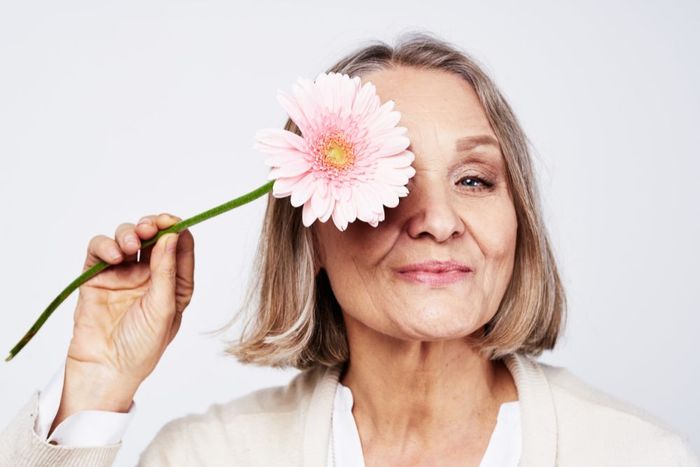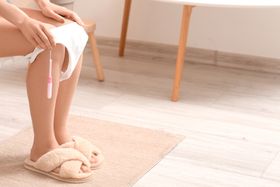My Story: Learning to Embrace Life and Changes in Menopause
Updated March 11, 2025.

Written by June Potts
Menopause is often referred to negatively in our modern world. And this often includes my own experience. But it doesn’t need to be that way! If women are prepared and educated about the menopause and the 34 associated symptoms, they can make informed decisions based on what’s right for them. And if we also educate them about possible solutions, their journey will be even more smooth!
It’s important to remember every woman will experience menopause differently – one size does not fit all. However, research tells us women who prepare for menopause generally experience fewer symptoms. They are more in control and lead fuller, happier lives during menopause.
Menopause is a natural, biological occurrence. The precursor to menopause (perimenopause) can last 4-10 years, and with average life expectancy increasing, as well as retirement age, more women are now working through menopause than ever before.
What does this mean?
Sadly as a society, we fail to recognize menopause as a natural, biological occurrence that will affect half the population in the world (affecting 4.4 million working women, aged 50-64 according to ONS, 2019). As a result, silence and stigma still continue. This is amplified in the workplace, where the ‘M’ word is often taboo, resulting in 90% of organizations failing to recognize menopause as a business issue. Despite over 14 million sick days being taken each year, linked to menopause symptoms, menopause is costly, yet many businesses remain silent on the matter.
In a positive turn, popular culture is changing the way menopause is perceived, especially as more women really get to know and understand their own bodies. A focus towards women’s experiences of menopause at work is being spoken about in broadcast and print media, suggesting women are ready to talk about the menopause. The question is, are you ready to talk about it? And, are you ready to speak about it with your employer? Or are you a senior manager willing to speak about it with your employees?
So how do I know these things?
Life sometimes has a funny way of getting you to where you need to be in order to impact and challenge “social norms.” Personal journeys are often an uphill battle requiring resilience and strength of character to eventually reach a safe space.
For the past 7 years, I’ve been riding an emotional rollercoaster, and here’s why – this is my menopause story.
At age 47, I found myself in the ‘sandwich generation' - juggling the challenges of an elderly parent with dementia, a husband diagnosed with cancer and a daughter studying for exams. Life was stressful, mirroring that of a typical, textbook case study. Mood swings, forgetfulness, fatigue, and paranoia were symptomatic of what I thought was "just" a lack of sleep, worry, and anxiety. Looking back, I was experiencing perimenopause – who knew?
The tipping point came at age 49 when I eventually consulted my GP, having collapsed with endometriosis pain. I was referred to a consultant, who due to a long-term history of endometriosis and PMS, bordering on Premenstrual Dysphoria Dysfunction (PMDD), I was provided with the option of undergoing a bilateral oophorectomy. Equipped with the knowledge a total hysterectomy would catapult me into menopause; I grasped the opportunity. The reason being I had suffered a hormonal imbalance since puberty, and I just wanted to feel normal. This was my opportunity to be the person I might have been.
Entering menopause
Nothing prepared me for menopause. Within four weeks, I experienced the top five menopause symptoms, my life was in disarray. I couldn’t function. I suffered hot flushes, night sweats, insomnia, irritability, and brain fog. Like most women, I soldiered on. Having had a poor experience with HRT in the initial stages, I discounted this, choosing to manage my menopause holistically by making lifestyle changes, such as cutting out alcohol, reducing my caffeine and spicy food intake, and increasing my exercise levels.
I also utilized a device called a Lady Care, which helped with hot flushes and bloating – it was my lifeline. I would often go into meltdown if I misplaced it, due to the debilitating menopause symptoms. Still, I prided myself on attending work every day as the Head of Customer Contact, responsible for a 60 seat call center. As I enjoyed the kudos from winning a bronze accolade at the European Call Centre and Customer Service Awards, I was coping - or so I thought.
A change of senior leadership at work, and a new, less informed manager resulted in my being side-lined from a senior management position, without discussion. I had become upset on a couple of occasions, I was showing signs of stress, and I was described as “moody” – I also over spoke (I’d forget if I didn’t)! Mortified, I found the courage to divulge my menopause status, despite working in a male-dominated workplace. Sadly, my employer was ill-equipped to support me, other than to offer a new, less significant role and email me a token six sessions with a counsellor with no HR follow-up.
I was left to vacate my office of 16 years watched upon by a team of 60 people. This event still pains me, to the point that my cortisol levels increase, my stress levels rocket, and I experience an ache in my chest. Symptoms since diagnosed as post-traumatic stress disorder.
Learning to live with menopause
At the time, l felt humiliated, isolated, and excluded, resulting in a loss of confidence and self-respect. Having undergone a hysterectomy, nobody took the time to talk to me or to help me understand how my menopause symptoms were affecting my work, behaviors and/or personal life. Consequently, my experience of working through menopause was damaging, difficult and unnecessary. In part, I still carry the psychological scars.
Despite this, the reality of my situation forced a positive change. I applied for flexible working and started a part-time MBA course in an attempt to rebuild my career and confidence. Now, I’ve graduated with a distinction and an award-winning dissertation. My research covered the organizational barriers for change leading to menopause remaining the last workplace taboo.
Made redundant in March 2020, I’ve reinvented myself as a business consultant specializing in menopause at work. In a nutshell, I educate organizations to understand why menopause is of importance in the workplace and how it affects the bottom line. I understand the importance of the psychological contract and leader-follower dynamics in building trust that needs to be embedded in an organization's culture, rather than listed as a token organizational value.
Research highlights many women do not divulge their menopause status for fear of bias and discrimination. Without trust, it’s difficult to create an open, inclusive culture necessary to create a menopause friendly workplace. This is where my experience comes in. Having lived, worked, and researched menopause at work, it’s what I do. I have succeeded in turning a negative into a positive. Menopause is my passion and supports my future aspiration to complete a PhD, a continuation of my Master's research, Menopause in the Workplace: Flushing out the Taboo.
I train, coach, and present to leaders, managers, and employees about why menopause matters at work. With an operational, training, and academic research background, combined with experience in culture change and strategic business consultancy, I offer a 360-menopause solution for all organizations, regardless of size and locality.
An advocate for women’s health and well-being, I use storytelling, active learning, and interactive techniques to engage and raise awareness - I provide a voice to a topic often silenced.






